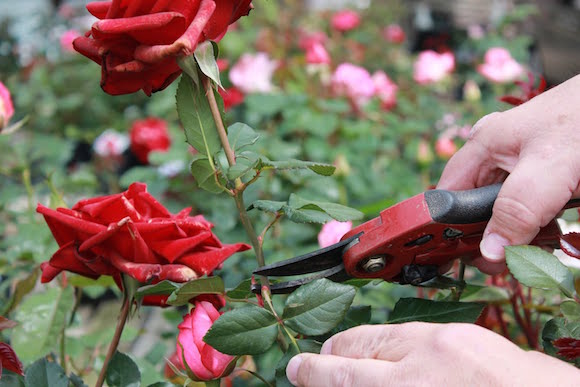In this weekend’s gardening column, Donegal Daily’s Conor Gallinagh discusses some tips and tricks to keeping your roses at the best of the summer.
Pruning
Summer pruning is an important aspect not only to encourage a good growth habit or to restrict from getting out of but also to encourage a second flush of flowers.
So not only deadheading the roses but also pruning back after they have finished flowering will encourage repeat flowering.
It is important to note that only a light pruning is required and that winter pruning of roses is done for a different reason.
Dead Heading
To ensure a longer lasting flowering time-frame deadheading should be regularly carried out on the roses. Deadheading is the method of removing dead flowers from your plant.
It is important to make sure that time and effort is put in and it is done right, that the seed capsules are removed and that you are not just pulling off the petals.
Disease Control
The two most common diseases associated with roses are a black spot (diplocarpon rosae) and powdery mildew (Podosphaera pannosa).
Rose black spot is a fungus disease and is easily recognised with black markings on the leaves. It can cause an unsightly appearance on the roses and become quite serious if not treated.
Powdery mildew is another fungus disease that occurs on roses. Like the black spot it needs favourably weather conditions (humid) for it to develop.
For the treatment of mildew and black spot, there are many different treatments available both chemical and non-chemical and greatly depends on how seriously affected the roses are and your preferred method.
To maximise your roses it is important to minimise the number of diseases impacting on it.
Pest Control
The most common of all pests to attack the roses are the aphids (greenfly). It is quite easily recognised as a bright green insect-like and tends to gather in large colonies on the rose
The aphid can have a devastating effect on the roses causing a number of afflictions. From viruses, appearance, sap damage, heavy infestations can lead to shooting damage and damage to the flower.
Again there is a number of treatments available to treating aphid attacks on roses both chemical and non-chemical.
Natural predators such as ladybirds should be encouraged into your garden as both at the larvae adult stage attack the aphid, therefore, reducing their impact.
Another remedy is the use of garlic spray to prevent and control aphids as well as many other garden pests such as slugs having an impact on your plants and roses.
Feeding
As you can imagine it takes a lot of energy to put on that show of flowers so it is important to give them a feed.
Not only whenever they are in flower but also when the roses are preparing to produce flowers.
A simply liquid feed will provide a quick boost to the roses but it is also important to provide a longer lasting fertiliser at least once a year if not twice.
Mulching will provide another source of feed and this should be carried out in early spring.
Happy Gardening!
Conor Gallinagh
BAgrSc Horticulture
MCIHort
cghorticultureconsultant@gmail.com
0876496887
Tags:







